Rising stars come and go in this sport. But there’s one 16-year-old phenom from Sydney who’s here to stay – and has those in the know predicting unimaginable success.
It’s the 1979 Masters, and an inquisitive American golf writer is chewing the fat with Australia’s Jack Newton when he starts interrogating him about his new mate Seve Ballesteros. The young Spaniard had threatened the leaders all week at Augusta National, turning heads with a dazzling display of shot-making before eventually settling for a tied-12th finish alongside Newton. The Yanks wanted to know more. “What about this kid, Ballastinos or something. What’s his name?” the scribe asks Newton. “Well, you’d better learn how to spell it. Because he’s going to be around for a while and he’s going to win a lot of tournaments. And big ones,” Newton deadpanned.
Twelve months later that same young Spaniard returned with a claret jug and won the famed green jacket. Newton finished equal second as an undisputed legend was born.
Those same conversations could take place again someday soon, this time about a 16-year-old Sydneysider who, ironically, is a product of Newton’s bountiful junior golf foundation. Jeffrey Guan is his name… that’s Jeffrey with a ‘J’ and Guan, ‘G-U-A-N’. Remember how to spell it. Because he’s going to be around for a while and he’s going to win a lot of tournaments. And far bigger ones than he’s already claimed. Is this kid the next Seve? No. Could he be Australia’s Next Big Thing?
Every now and then, those of us in golf media get a tip-off about a young player that we should keep a close eye on – a phenom, if you like, who could be The Next One. But it’s rarely good oil. Anecdotal evidence suggests just 0.006 percent of those who dare to dream and attempt to qualify for the PGA Tour actually achieve the feat. That’s about 1 in 17,000 for those playing at home.
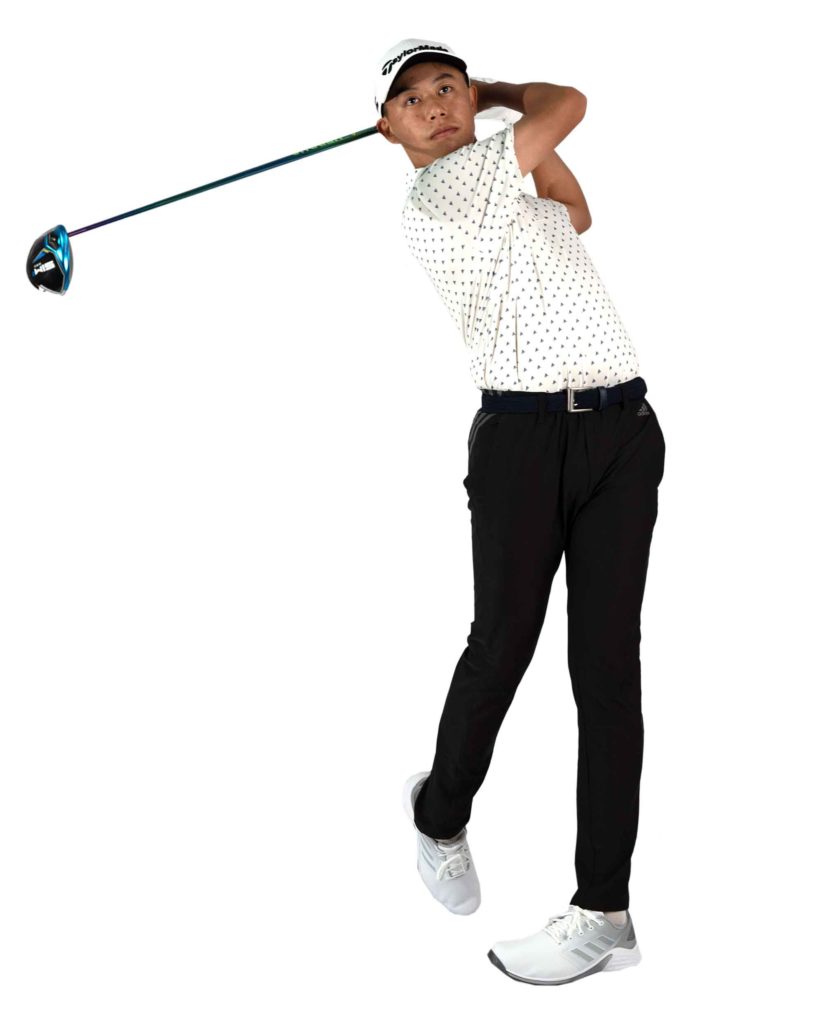
Occasionally, though, the crystal-ball brigade gets it right. Adam Scott and Jason Day immediately come to mind, and more recently, Cameron Smith. They also warned us about LPGA star Minjee Lee years before she would go on to become world No.2. The common denominator? They all showed standout ability in the junior ranks, yes, but they had something extra special between the ears, a robotic ability to block out everything in order to execute the right shot, almost every time. With that came the habit of winning, and an aura among their peers, like everyone else was playing for second.
Well, Australia, there’s another one.
When we were first alerted about Bexley Golf Club junior Guan, we treated it like any other suggestion: Duly noted. We’ll keep an eye on him, for sure.
But it quickly became apparent we were dealing with a different kind of talent. The phone calls kept coming. Not from family or friends wanting to get their boy some media attention; they came from fellow players, administrators, coaches and even equipment companies.
“You’ve got to see this kid play, he’s f–king unbelievable!” warned one PGA Tour of Australasia player after seeing first-hand how Guan goes about things on the course.
“He’s a jet. I haven’t seen anything like him. The way he thinks his way around a course isn’t something he should be able to do at his age,” adds an Australian tournament official.
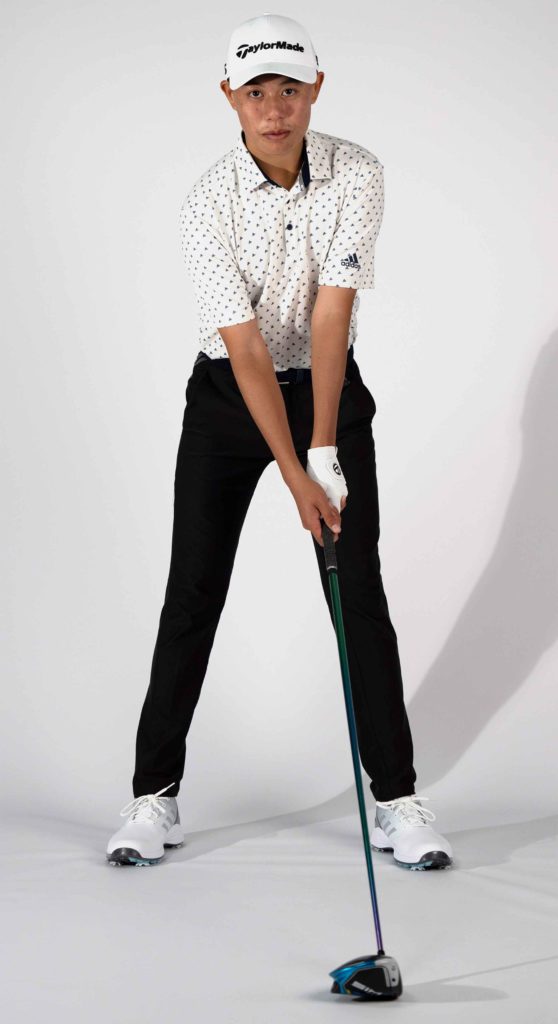
If you haven’t seen Jeffrey Guan swing a club, a quick glance at his playing résumé tells you everything you need to know: Australian Junior champion, New South Wales Junior champion, NSW Men’s Stroke Play champion, Harvey Norman Week of Golf champion, South Coast Junior Masters champion, Australian Men’s Amateur runner-up and NSW Men’s Amateur runner-up. He also took out the recent Adidas Junior 6s events at Royal Sydney and Yarra Yarra.
Still with us?
Guan was the Bexley club champion as a 12-year-old. He then took that up a peg or two by becoming the club champion of the distinguished Australian Golf Club at 14, winning the 36-hole matchplay final against his senior counterpart, 8&7.
But wait, there’s more.
After 26 rounds (at the time of writing) this year at club, state and national levels, Guan was a combined 81-under par and a whopping 119 shots better than the scratch rating in those rounds – that’s how much better he was versus the score a scratch golfer was expected to shoot on each course. He’d carded seven-under three times, and an unofficial course-record nine-under at Links Shell Cove on the NSW South Coast.
Then, maybe the most impressive feat of all – the putt he had for a 59 at the Greg Norman-designed The Vintage in the NSW Hunter Valley, which he had no idea about until he tapped in for a 60 (“I would have given it a more aggressive stroke had I known!” he later tells us).
Oh, and did we mention he plays off a handicap of plus-6.5?
All this at 16 – SIXTEEN! – years of age.
They’re numbers that have convinced TaylorMade Golf to continue its support of the Endeavour Sports High School prodigy on his inevitable journey to the professional ranks. But if the company’s general manager in Australia and New Zealand, Andrew Bayliss, was trying to keep a lid on things, he failed miserably.
“He actually gives me goosebumps… just the thought of where he’s going to end up,” Bayliss admits. “I wouldn’t even want to do him the disservice of saying he’s the next Jason Day. He’s possibly bigger and better than that.”
With a scoring average of “around 68” at his home club, Guan has suddenly emerged as a genuine smoky for this year’s Australian Open, reportedly on track for a November return at, you guessed it, The Australian Golf Club. But if you want some juicy odds for the smooth-swinging teenager, you may want to hurry. “Get on him now because I have a feeling there are going to be some sizeable bets placed on him before round one,” jokes Bayliss.
If you’re still not convinced about this kid’s credentials, we present you Guan’s mentor since day one: Beverley Park Golf Club professional Paul Davis.
“I grew up playing alongside a lot of supremely talented guys – names like [15-time Japan Tour winner] Brendan Jones – and I’ve got to say, I’ve never seen anyone as talented as this kid. His ability is out of this world,” Davis says.
“But it’s not just his knack for shooting low scores. It’s his composure under pressure. The number of times he’s hit clutch shots to win tournaments, the way he doesn’t let anything affect him out on the course… he’s already tour-level in that regard. He works harder than everyone else and remains such a humble person.”
It’s a work ethic passed down from his mother and father, Chinese immigrants who today make ends meet in a kitchen and driving taxis. His dad, Ken, was once a very capable golfer himself, playing off single figures and placing a plastic golf club in his son’s hands for the first time when he was 3. What a masterstroke that may turn out to be. If Guan continues on this current trajectory, Dad will be ditching those tiresome taxi fares for private jet privileges in the not too distant future.
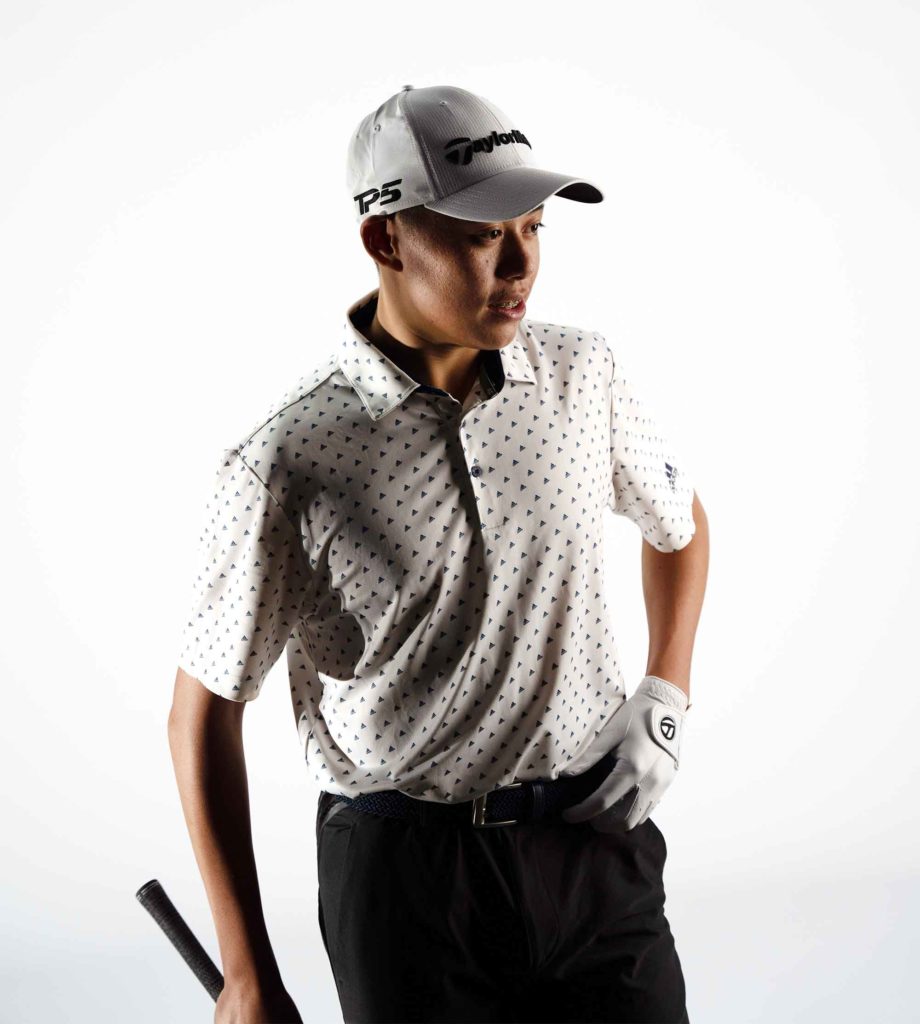
Until then, however, Guan is likely to continue playing multiple rounds a day with mates, like he did straight after winning the Yarra Yarra Adidas Junior 6s event in April. “You’d think the last thing you’d want to do after winning a tournament would be to go back out and play another 18 holes,” Bayliss says.
“Not Jeff.”
‘Committed’ doesn’t even begin to explain the lengths Guan goes to for a hit. When Mum and Dad can’t give him a lift, he often catches a bus home from school with his brother, then hops on a train from Rockdale to Mascot, before walking the remainder of the 90-minute journey to The Australian Golf Club. That’s an hour-and-a-half for, sometimes, no more than an hour of putting practice.
“I think Jeff’s underlying motivation now is all about giving back to his parents,” adds Davis. “He really appreciates the position their hard work and sacrifices have put him in. Personally, I’ve just always wanted to make sure ‘JG’ had every opportunity to excel, as so many good players either get bad advice or don’t surround themselves with good people that will have a positive influence in their lives. I totally believe Jeff has what it takes to succeed in golf, and I hope I’m there to watch how it unfolds.”
After interviewing Guan for our Q&A on the following pages, we were invited to tee it up with the phenom himself at The Australian Golf Club. It took just two swings for us to see what all the fuss was about. After pushing his opening tee shot in between the bunkers down the right-side of the first fairway (a rare miss for him, we’re told!), he assessed a tricky lie in the rough, pulled out his fairway wood from about 190 metres, rain falling, and gave it an almighty whack, chasing it up to the green to about eight feet from the pin for an eagle putt.
This writer just stood there for a moment, stunned. “He’s 16, eh?” I asked Davis, who tagged along for the walk. The wry grin on his face said it all.
Jeffrey Guan, folks. Remember the name.
[Photography by Ben Owens]
Australian Golf Digest interview with Jeffrey Guan
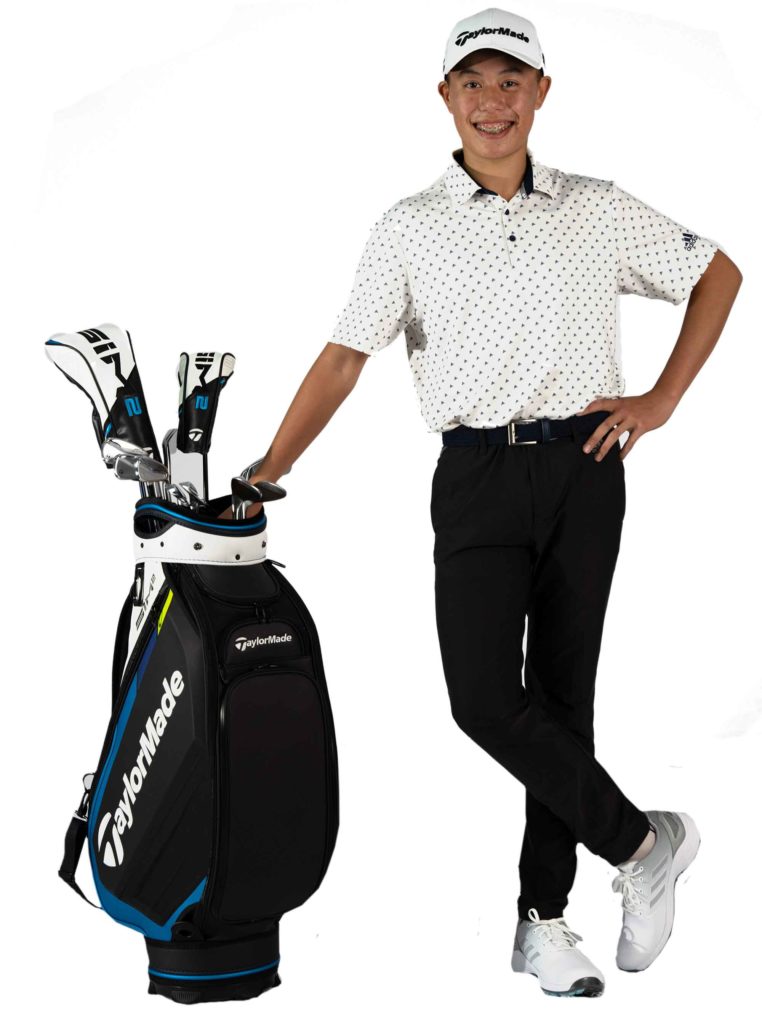
JEFFREY GUAN
Australian junior champion
Age: 16
Handicap: +6.5
Club: The Australian
Career-low round: 60 (11-under) – The Vintage, NSW
Instagram: @jeffrey_guan14
AGD: Tell us when and how you got hooked on the game?
Jeffrey Guan: When I was 4, my dad took me to a driving range with his friends and I just wanted to join them in hitting a few golf balls. If I remember correctly, he bought me a few plastic golf clubs and I had a few hits with him. But then one day the driver of the plastic golf set broke. So the week after he got me a set of cut-down steel clubs and that was it – I was hooked from that point.
What was it about the game that appealed to you so much?
I think it really helped when I joined Bexley. I had a couple of friends that played golf so I really enjoyed spending time with my mates playing an outdoor sport. I won’t lie, I also loved smacking a golf ball and seeing it fly straight [Laughs].
What sort of golfer was your dad back in the day?
He used to play off about 4 or 5, but nowadays he doesn’t really play that much. He just chips and putts. But his short game is unreal. I think he’s off about an 18 handicap now and is still a wonderful mentor for me, on and off the course.
What are some of the lessons he’s taught you?
With Dad it’s been more about my technique, just teaching me the fundamentals early on through his experience and talking to me about what I should do and how to do it. He’s been particularly influential in helping me develop a good attitude on and off the course. With his work ethic, he’s always set a good example for me and I really want to follow that.
Can you remember your first proper golf lesson with a PGA professional?
I think I got my first official golf lesson when I was 6 years old. It was with Glenn Whittle at The Ridge. I still see Glenn today. He’s had such a huge influence on the development of my game.
Winning a club championship at any age is an amazing achievement. You won your first as a 12-year-old. Describe the feeling.
I was pretty nervous, actually, on the first tee in the final around. Even though I was a couple of shots ahead – I think seven or eight – I didn’t have the best last round. I shot eight-over, from memory. Luckily the other guy who came second carded nine-over, so I was a bit fortunate to win that year.
What did winning that day, against the men, tell you about yourself?
It was such a big confidence booster for me, just to be able to win something that nobody expected me to win as a 12-year-old. People were coming up to me and congratulating me and you could hear the chatter in the clubhouse. Not long after that I had the courage to go play in some Jack Newton Junior Golf events, where I met other passionate golfers my age. I made new friends and suddenly golf just became more fun and addictive.
Two years later, you’re a member of The Australian Golf Club in Sydney, and you win the club championship there. How on earth did you pull that off?
I remember I only just made the top-16 for the matchplay portion of it. That was my main target, to be honest, to get through the strokeplay section. What came next surprised me as much as anyone else. Again, I got a bit fortunate to win a few matches and make it into the 36-hole final and then I played some pretty good golf to win that so, yeah, I felt pretty lucky.
You won the final, 8&7, even though you couldn’t reach a lot of greens in regulation. What was the secret?
I just played my own game and didn’t worry about what my opponent was doing, or how far he could hit it. I just managed to hit the ball dead straight that day – hitting driver-3-wood towards the greens to leave myself with chances to get up and down. It worked pretty well because I don’t think I had many bogeys that day, probably one or two in total for the 29 holes I played.
Is that a big part of your mentality when you play, Don’t Make Bogeys?
I dislike making bogeys, like most golfers, but I just try to make the least amount of mistakes as possible on every hole. The way I see it, to make a bogey you usually make two mistakes on that hole. So, if I manage to make only one mistake, I try not to make any more mistakes to finish par on that hole. Making one mistake, for me, is eliminating that birdie opportunity. I don’t want to let it get any worse than that. It doesn’t always pan out that way, of course [Laughs].
You’re now also under the tutelage of Gary Barter via the foundation at The Australian, who coaches one of your idols, Matt Jones. What’s Gary taught you?
My time with Gary has been more about swing and weight transition. I love Matt Jones as a player, his swing is so good. It’s funny to think Gary teaches him and now he’s helping me. It makes you want to learn more to get that perfect swing. As a junior foundation member at The Australian, we get tickets to the Australian Open when it’s held at the club. I love using my time off school to walk around and follow the pros, guys like Matt, just to see how they go about it. It’s pretty cool being able to pick up what they’re thinking and how they play the course I now call home.
You mentioned the Australian Open at your home course. There’s a good chance that happens at the back end of this year, pending the COVID situation in Sydney. After winning the Australian Junior title, you must be pretty excited about making your debut in the Australian Open at your home club?
I’m definitely looking forward to it. I might need to go there every day just to see the green breaks and work it all out. I’m sure it will play a lot differently in tournament condition than it does on my Saturday round [Laughs].
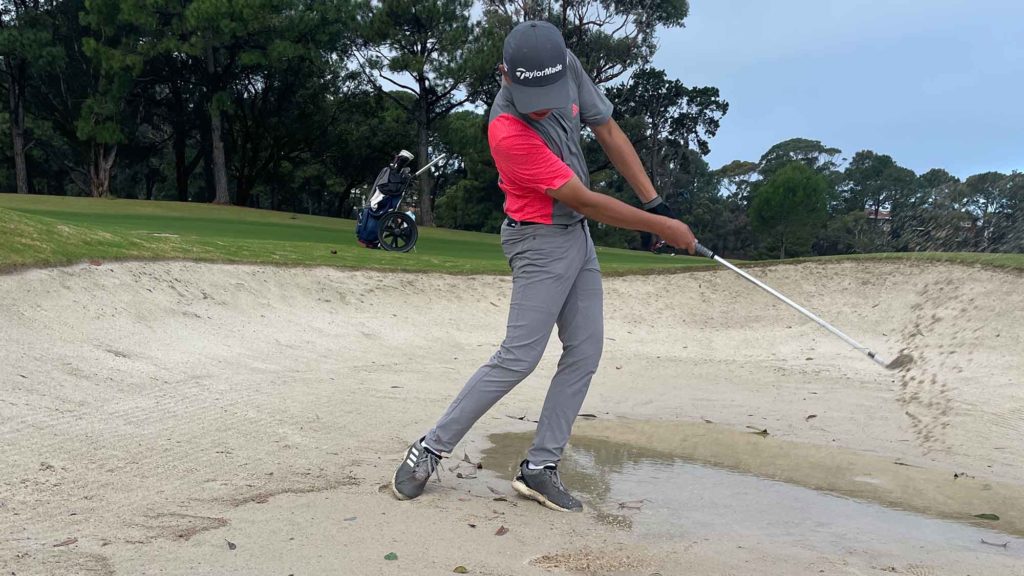
MY ADVICE
Hit the ball first in fairway bunkers
When I’m in a fairway bunker, my immediate thought after walking in and assessing the lie is, Make contact with ball first. I know if I can avoid taking sand before the ball, I’m a good chance to make proper contact and pull off a shot that’s hopefully not too different to a normal lie from the fairway. Don’t think about the bunker lip or what’s between you and the green. Concentrate on making contact with the ball and aim to merely brush the top of the sand, taking as little a divot as possible.
Your scoring average around there has a few people keen to put a sneaky bet on you. Reckon you’ve got what it takes to get high up the leaderboard?
Well, the setup at The Aussie suits my game. If I can manage to knock a few balls close, who knows? The greens are so smooth and pure there, it’s pretty hard to miss a putt unless you misread the break. My intention, like it is in every round, is just to hit it as close to the flag as possible, and then the birdies will hopefully come. But I don’t have any expectations.
What would you say are the strengths and weaknesses of your game?
The strength of my game would probably be putting. A few weaknesses would be miscalculating shots on the course and trying to create new ones. But I’ve got time to work on that.
What about equipment? Would you call yourself a gear nerd?
Yeah, I am a little bit. I love what today’s gear can do for your game. I’m currently using a TaylorMade combo set of irons. They’re like semi-blades. I was after more accuracy with my short irons and more forgiveness in my long irons, and these certainly deliver both. Then, with my driver, obviously as much distance and control as I can get the better so I can continue to improve my scoring potential. The TaylorMade SIM2 driver has given me a big jump in ball speed so I’m pretty happy about that.
Now, that putt for the 59 at The Vintage… How close did it get and were you nervous?
I didn’t know I was going to shoot 59 had I holed it. If I did, I probably would have given it a proper go [Laughs]. I was just hoping I didn’t hit it too far past the hole because it was like 25 feet, downhill and off the green. All I was thinking was, Just hit it near the hole, and if it drops, it drops. It was a pretty hard putt but I’d like to have it again.
When you’re a chance to shoot 59, you’re clearly ‘in the zone’. What does that feel like?
[Laughs] I don’t know. It’s just subconsciously giving myself more chances, I guess. A birdie’s a birdie, I don’t think of it after I play that hole. As soon as I finish a hole, I block it out and then focus on the next shot, like it never happened. Obviously I was doing a good job of that because I remember finding out I was, like, 10-under after nine holes. It was unbelievable.
You seem to have a great network around you. Your school and mates have obviously been a great help with supporting your golf?
Yeah they have. They congratulate me every time I play well in a tournament. And they’re really supportive, so I’ve got to thank them a lot. My school has actually let me leave for important golf tournaments and they give me the homework in a booklet to complete while I’m away. It’s working really well – I just finish the booklet and then I hand it into the teachers on the due date. Paul Davis, Beverley Park’s pro, has also helped me a lot. He’s helped me with my equipment choices and with that scholarship application at The Australian. I really can’t thank him enough for taking me under his wing at such an early age.
You seem like you’re very determined to make it to the professional circuit. What are the plans moving forward?
I think so. I hope so. I’m just looking forward to playing good golf, then hopefully my game takes me to higher levels. The goal will be to turn pro in two years, when I’m 18 and finished school. In the meantime, I just want to try to shoot every round under par. I generally only get to play off the white tees too, so as I hit it farther and farther, my target will reach higher expectations. My dream as a little kid has been to play the PGA Tour and be a top-50 player in the world.
What’s the best piece of advice you’ve ever received?
There’s actually quite a few pieces of advice that I’ve received over the years. The first one is related to nearly every round of golf: there’s always that little devil on the side of our shoulder that says, ‘Oh, you haven’t missed an eight-footer yet,’ when you’re standing over one. And I was told that’s the point where you just have to focus if you want to sink that putt. The other one is related to dealing with missed opportunities: even if you do miss a putt, there’s always more holes to come. The birdies will come sooner or later if you just keep lifting your head up high and hitting golf balls close to the hole.
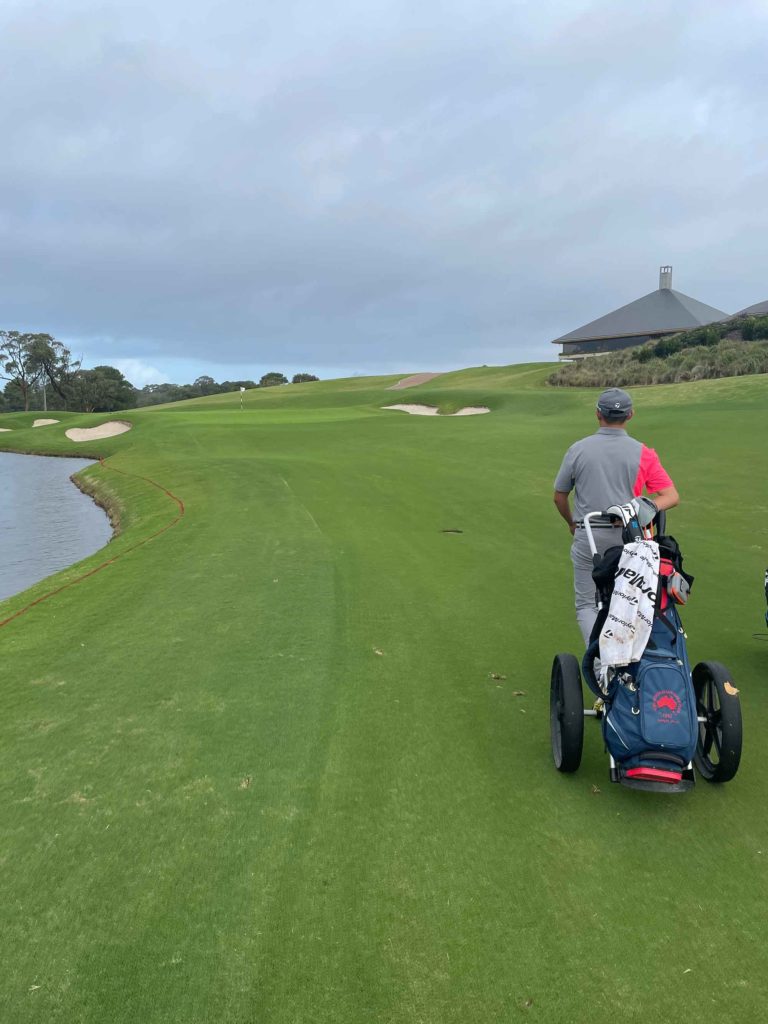
MY ADVICE
Copy Scotty between shots
I’ve heard people say they think I’m very composed out on the course and that nothing seems to faze me. That’s nice. I think it comes down to my routine between shots and how I ‘switch off’. I follow Scotty’s (Adam Scott) rule. After I play a shot, I remove my glove and that Velcro sound is the trigger for me to relax and talk to my playing partners about anything. A lot of the time I talk to my friends about schoolwork and stuff like that. When I’m approaching my ball for the next shot, I put my glove back on and that’s the trigger for me to ‘switch back on’ and focus on what I need to do on the next shot, no distractions. Find your trigger move and make it a ritual.



